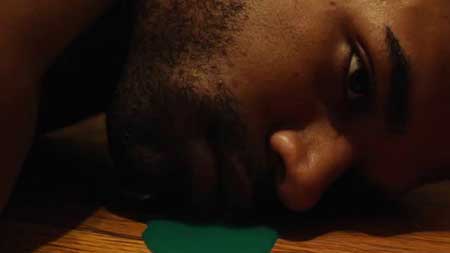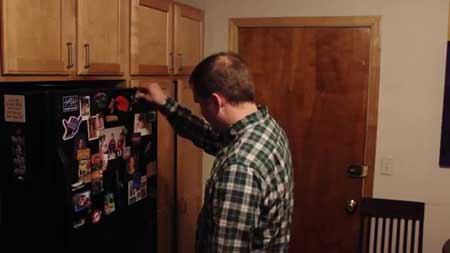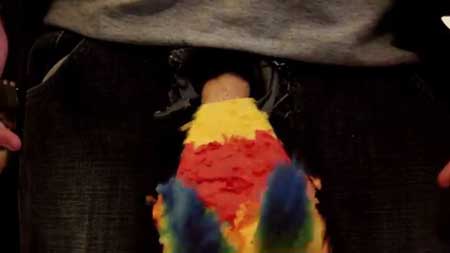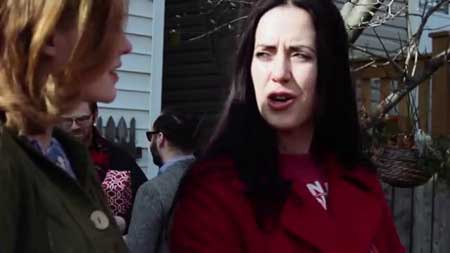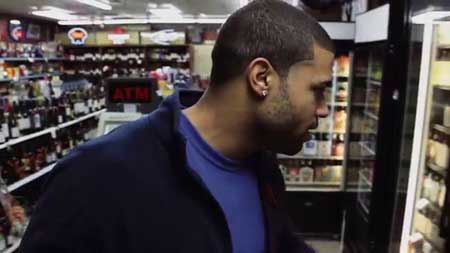SYNOPSIS:
In lieu of unionizing labor, the angry spirit of an abused, and very much dead, factory worker takes possession of a piñata in order to turn the tables on a cold, uncaring world filled with people-on-piñata violence.
REVIEW:
With this release, it looks like director Stephen Tramontana has finally bounced back from his rather public tussle with Quentin Tarantino; it appears their spat was over Tarantino’s alleged appropriation of the general concept and title from Tramontana’s 2003 film, Grindhouse. We’ll know if there’s any basis to the plagiarism claim if Tarantino announces a Killer Piñata project in the near future. Until then, we’ll just have to make do with this little bocado cursi.
The film opens with an establishing shot of Chicago’s stately skyline, then narrows in on the grittier side of things, eventually settling in on a Latino party supply store called Dulce Landia; the inexplicably hook-handed shopkeeper (Joette Waters) arrives and hobbles into the facility to promptly find the brutalized corpse of an employee, the letters P-I-N-A scrawled in the employee’s blood on the floor, and a seemingly innocuous, rainbow-colored paper mule on its side a few feet away. The shopkeeper gasps, the stridulous electronic theme music revs up, and credits roll over loving close-ups of a blood-spattered piñata; then, one week later, David Goodman (Steven James Price) arrives at the store, agitated and in hot pursuit of the party favors he vaguely recalls his wife asking him to pick up for their son Luke’s (Elias Acevedo) birthday. With all the exasperation of a beleaguered husband, David bribes his way into possession of the, unbeknownst to him, deadliest of all killer piñatas.
Meanwhile, his daughter, Lindsey (Eliza-Jane Morris who, in some scenes, looks remarkably similar to a brunette Melissa Joan Hart), is in a real pickle. She’s got a boyfriend (Billy Chengary) who’s not really her boyfriend anymore, but he doesn’t know this, because she hasn’t told him about her awakening sexual attraction to Rosetta (Lindsay Ashcroft), her best friend, who has an overwhelming tendency to announce her obsession with man-meat at the slightest provocation; Rosetta even goes so far as to openly smolder over Lindsey’s dad, who also has his own wondering eye.
To make matters worse, dad’s planning to take everyone to a popular amusement park to celebrate Luke’s birthday. Lindsey talks her way out of the trip, hoping to spend a little alone time with Rosetta, but then friends arrive after the rest of the family leaves, turning Lindsey’s planned-for romantic tête-à-tête with Rosetta into a party, which soon becomes awkward due to nearly everyone being killed by the deceptively cheery-looking piñata dad bought at the Dulce Landia.
With jalapeño firmly planted in cheek, the film aggressively, and without shame, parodies every tired horror movie trope it can lay its hands on. Although frequently successful with these jabs, the film does clink at times, inevitably tripping itself up by its own overreach and low budget. Like most parodies, it often gets lost and meanders a bit, zeroing in on its own navel; the writing is periodically clever, bordering on witty, while at other times, it embraces (not so wisely) the pure absurdity of the situation, resulting in a juvenile, solipsistic climate in which the viewer’s awareness of the filmmaker’s awareness only accentuates the tyro feel of the whole film.
The acting runs the very narrow gamut from adequate to awful, although this seems to be more due to the budget’s requirement for a quick shoot and Tramontana’s lack of discernment in the editing room rather than to poor skills on the actor’s part. While the lighting is dodgy at times, there is some very interesting, though limited, camera work: occasional menacing POV shots, energetic hand-held attack shots, suffocating close-ups, and affective use of the piñatacam.
Overall, Killer Piñata comes off as an unrefined, overly-affected minor entry in the so-stupid-it’s-smart category of parodies. The laughs are few, the smiles are more frequent, the occasional wit is apparent, and the run-time is long enough to show the weaknesses of the filmmakers; it should have been cut down by an hour or so, removing the excesses and leaving a tighter, funnier, and more satisfying half-hour to forty-five minute short that could have included a couple of legitimate scares for balance. Instead, we’re left with everyone winking at the camera, and the scariest (and funniest) thing in the movie being Rosetta’s granny panties.
 Horror News | HNN Official Site | Horror Movies,Trailers, Reviews
Horror News | HNN Official Site | Horror Movies,Trailers, Reviews

